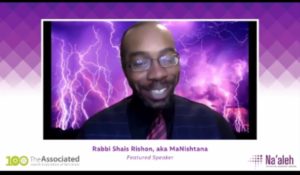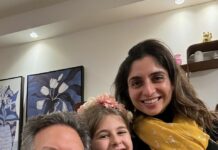
Na’aleh: The Hub for Leadership Learning, an agency of The Associated: Jewish Federation of Baltimore, held its third Annual Shoshana S. Cardin Leadership Symposium on Zoom on Sept. 12. Close to 100 people came on Sunday morning to hear from keynote speaker Rabbi Shais Rishon, who led a conversation on the Days of Awe and on interpersonal relationships.
Rishon, who uses the pen name MaNishtana, is a New York-based writer and public speaker who has written about Jewish and African American identity and is well known for his anti-racism advocacy.
Na’aleh was created three years ago as a result of a merger between three leadership organizations, ACHARAI: The Shoshana S. Cardin Jewish Leadership Institute,
The Darrell D. Friedman Institute for Professional Development and The Associated’s Center for Community Engagement and Leadership. The leadership symposium was established in honor of Cardin, a philanthropist and activist who died at 91 on May 18, 2018.
In addition to Rishon, speakers at the event included Rabbi Jessy Dressin and Ned Himmelrich, co-chairs of the event, who gave welcoming remarks. Ilene Vogelstein, one of Cardin’s daughters, spoke about her mother’s legacy and love for the Jewish community. Na’aleh Board Chair Debra Silberman Weinberg and Executive Director Bill Robinson gave closing comments.
Rishon, an Orthodox Jew who grew up in the Chabad Lubavitch community, spoke at the symposium about the Days of Awe, the 10 days from Rosh Hashanah to Yom Kippur. These days are considered to be fortuitous, Rishon said, in that they allow people to “rack up good deeds” before the end of the year. These 10 days also allow the Jewish people to be “even closer” to God. These days, Rishon continued, are an opportunity to seek forgiveness from fellow human beings and from God.
Rishon also spoke about relationships, in particular about finding a balance between separation and closeness in relationships with God and with others, in order to make those relationships sustainable. Rishon compared this balance to COVID-19, in which people want to be closer to friends and family, but need to stay away to keep everyone safe.
Rishon’s talk was followed by breakout sessions for participants to discuss excerpts from the Books of Exodus and Numbers, introduced with the overarching question, “How does separation inform closeness or closeness inform separation?”
Rishon dropped into the breakout sessions to listen and engage with participants. He also provided his own answer to the question. He said that while human beings need closeness, there is also a need for separation.
“We also have to be aware of what we have to sacrifice to make those relationships sustainable,” Rishon said. “It’s in pursuit of that closeness that we sacrifice.
“Today, visiting grandmother in a time of COVID, you have to sacrifice seeing her to keep her safe,” Rishon added.
After the symposium, Rishon said that he hopes the points he made about closeness and separation stay with attendees.
“I hope everyone took away that while closeness is important in interpersonal relationships, we also have to be aware of our limitations in pursuing it,” he said. “Boundaries exist for a reason, and too often pushing them reveals either our selfishness or our ignorance.”
Alyson Friedman, former marketing chair for Na’aleh, was one of the attendees at the event. She noted that some of the breakout groups discussed the importance of relationships in leadership.
“Rabbi Shais Rishon, our guest keynote speaker, did an excellent job leading our text study convening our community for the purpose of leadership learning,” she said. “The theme that relationships are at the core of good leadership was discussed at length in various chavrutah groups. Finding the right balance of perspectives among group members both within the group setting as well as outside the group in our daily lives is something we constantly strive toward.”
Rabbi Rachel Sabath Beit-Halachmi, who started her new role as senior rabbi of Har Sinai-Oheb Shalom Congregation over the summer, was also an attendee at the event. She said she found the symposium to be meaningful.
“Because I am a new congregational senior rabbi in the community, I was moved by the diversity and depth of connection in the learning,” Sabath said. “For me it was also an important moment to honor Shoshana Cardin z”l who taught me a great deal when she was the Chair, and I was a senior scholar at CLAL [The National Jewish Center for Learning and Leadership] about 20 years ago. Looking forward, the event affirmed what we all need to do more of in the year ahead: open our hearts, our minds and our doors so that we can hear more voices different from ours.”







